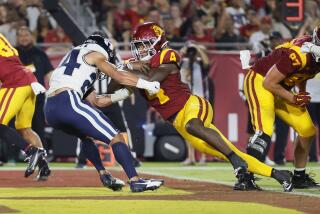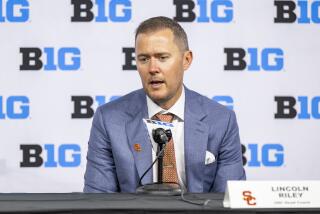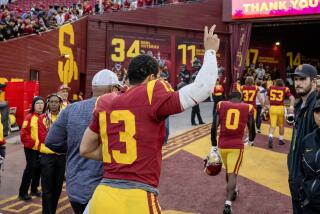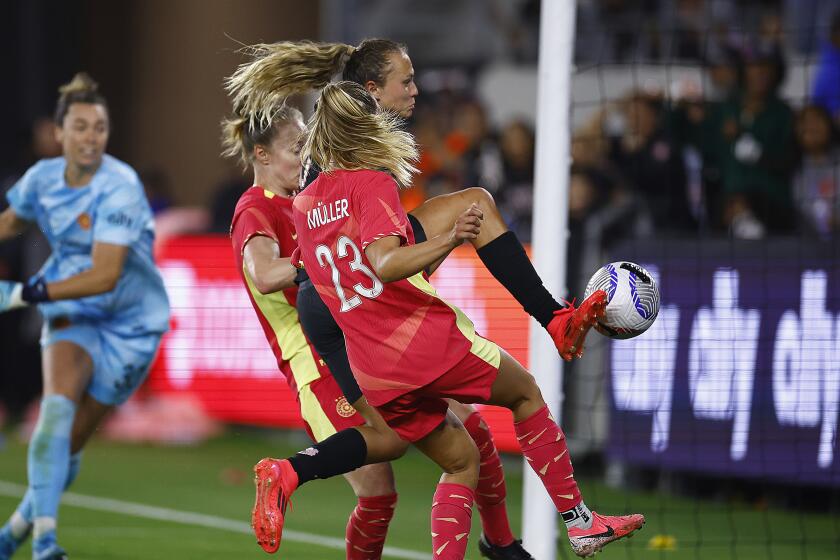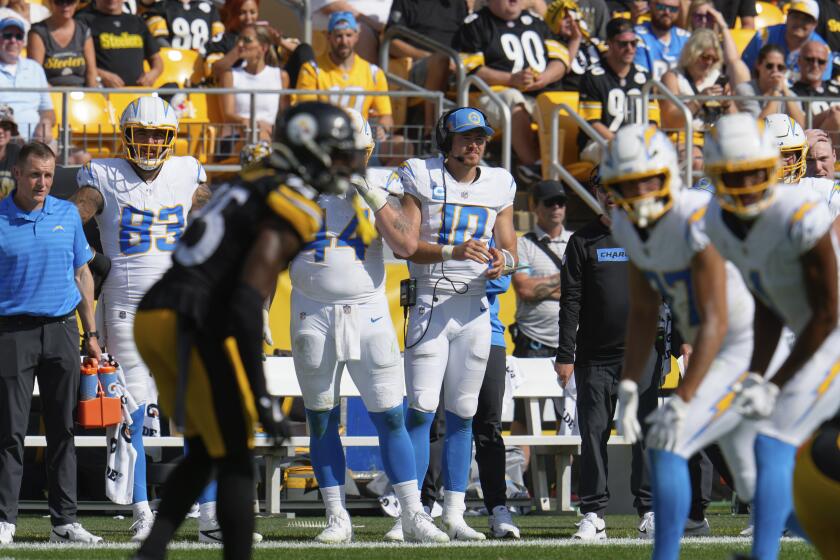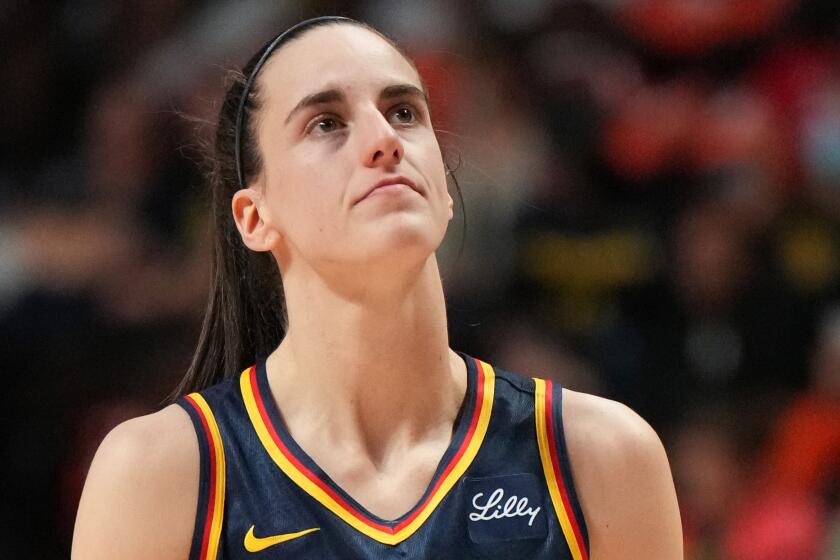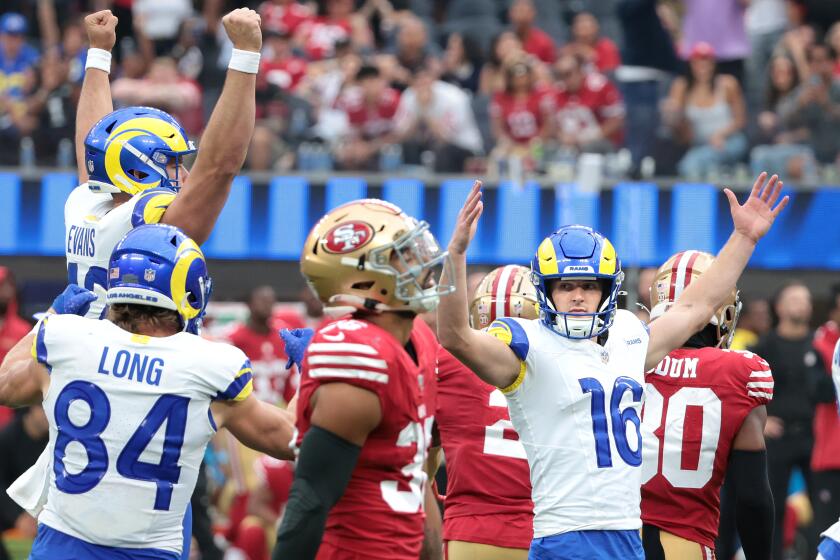Column: Clay Helton has to let Kliff Kingsbury totally run the USC offense
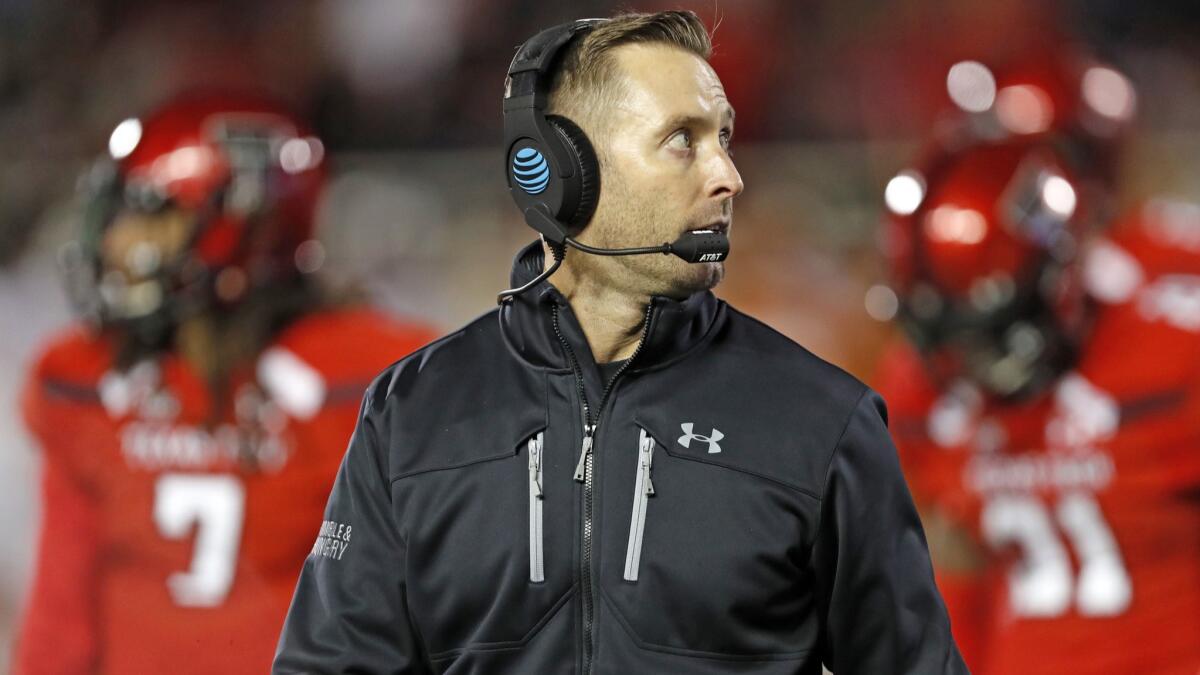
USC is about to land Kliff Kingsbury. Now comes the hard part.
Coach Clay Helton has to hand over the offense to him. Entirely.
Kingsbury’s ideas can’t be implemented half way. No hybrid system. If his version of the Air Raid Offense is going to work at USC, the Trojans have to be all in.
Kingsbury’s wide-open spread system would mark a major break from the program’s ground-based tradition.
Sure, the Trojans use some spread concepts and their quarterback now operates out of the shotgun on most plays. But the foundation of their offense remains the running game, with Helton continuing to preach the importance of a balanced attack.
This will be as much of a shift for Helton individually as it will be for the program as a whole. Helton is an offensive coach. When the Trojans slumped offensively this year, he reclaimed playcalling responsibilities from since-dismissed coordinator Tee Martin.
What Helton has to do is move into more of a CEO-type role and let Kingsbury do whatever he did to make Texas Tech one of the highest-scoring teams in the country. Kingsbury will inherit a group that can make his system work, with JT Daniels throwing to a group of talented receivers that include Amon-ra St. Brown, Michael Pittman Jr. and Tyler Vaughns.
Any gamble that involves the longstanding identity of a program is a considerable risk. Then again, the Trojans are in a position where they have to make that wager. Another year like this one and Helton is out of work. Another year like this year and the renovated Coliseum could be empty the following season.
Cooled ‘Stove’
This used to be one of the most entertaining parts of the baseball calendar, with the nonstop conversations about which teams should sign what players. The Hot Stove is almost out of commission, broken by a generation of analytically inclined executives determined to control expenses on the free-agent market.
It’s rare for a star player in his mid-20s to reach free agency and there are two of them this winter, Bryce Harper and Manny Machado. But the market conditions are such that there is as much talk about whether their markets will collapse as where they could be headed.
About the only interesting development related to either player was an online report that Dodgers co-owner Magic Johnson traveled to Las Vegas to meet with Harper. Johnson denied the story the next day. Oh well.
Baseball’s failure to make news in the winter might not be solely responsible for a leaguewide drop in attendance this year, but it’s certainly not helping. Compare that to the NBA, in which a robust free-agent market promotes its product over the summer and creates anticipation for the upcoming season.
Getting offensive
U.S. men’s national soccer team coach Gregg Berhalter said at his introductory news conference that he would soon travel overseas to meet with his players based in Europe. As he should.
His best player, 20-year-old attacker Christian Pulisic, didn’t look or sound particularly pleased over the last year with the team’s lack of long-term vision under interim coach Dave Sarachan.
Berhalter was asked multiple questions Tuesday about how he planned to implement the possession-oriented system he used when he coached the Columbus Crew of Major League Soccer. The reality is the U.S. is still at a point where the quality of its opposition will determine whether it controls the ball. The Americans should continue to dictate the tempo against teams such as El Salvador and Guatemala; they will have to be more pragmatic against the likes of Brazil and Argentina.
However the U.S. plays on a given day, the team will continue to be centered around Pulisic, the Borussia Dortmund attacker who is already the best player this country has ever produced. Berhalter’s main priority will be to figure out what predecessors Jurgen Klinsmann and Bruce Arena couldn’t — how to ensure Pulisic isn’t the team’s only source of offense.
With more young American players based in Europe than ever before — notable examples include 18-year-old strikers Josh Sargent and Timothy Weah — Berhalter could have more weapons at his disposal than Klinsmann or Arena ever did.
Pulling punches
Boxing’s heavyweight division isn’t any more back in the wake of Deontay Wilder’s draw against Tyson Fury over the weekend than it was in the aftermath of Anthony Joshua’s stoppage of Wladimir Klitschko two years ago.
Both fights were dramatic, but drama alone can’t make up for an obvious lack of quality. Fury and Wilder were credited with landing 155 punches — combined — over 12 rounds. That averages to fewer than 13 clean punches per round.
Follow Dylan Hernandez on Twitter @dylanohernandez
More to Read
Go beyond the scoreboard
Get the latest on L.A.'s teams in the daily Sports Report newsletter.
You may occasionally receive promotional content from the Los Angeles Times.

